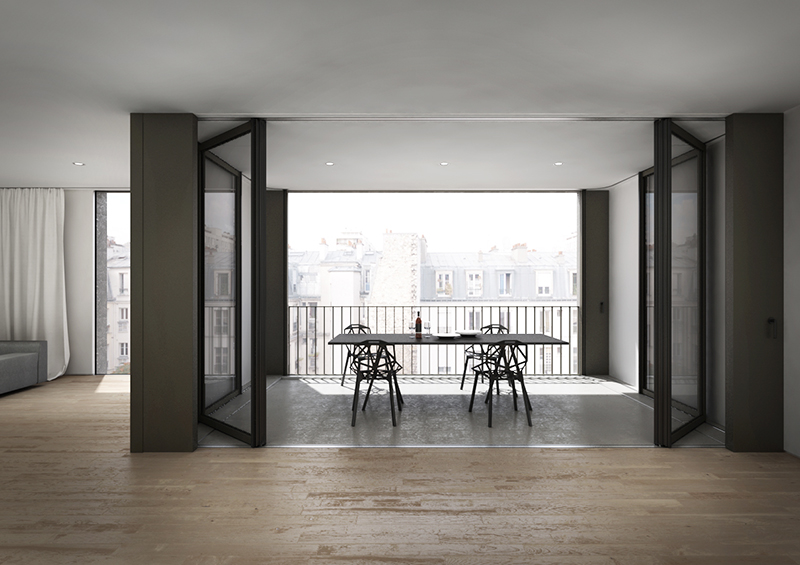flissade: From term project to start-up
A balcony in the summer, living space in the winter

Is it right that term projects should take up so much time and energy, only to end up gathering dust in a desk drawer? Not at all: For two former TUM architecture students, Lisbeth Fischbacher and Daniel Hoheneder, a single term project has changed their entire lives. "Prof. Gerhard Hausladen – a top name worldwide in the field of building energy technologies – usually had an awful lot to say when discussing term projects," Hoheneder recalls. "But he didn't have any comments at all for us. Silence. This could only mean one of two things: Either we were telling him a bunch of absolute nonsense, or our idea was really great."
And not only was their idea well received, it was also new. It solves a familiar problem: Balconies are stuck onto residential buildings like cooling fins on a heat sink and dissipate comforting warmth to the outside. Furthermore, this area of the living space is hardly usable when the weather turns cold. In the summer on the other hand hardly anyone would want to do without a balcony. "We've developed a movable primary envelope," explains Hoheneder's business partner Fischbacher, "a facade that can be moved anywhere desired."
A sliding door turns the balcony into indoor living space
In essence the invention is a series of window panels which can be moved to the outside of the balcony in the winter. The user increases living space, eliminates the "cooling fin effect" and makes use of sunlight to heat the room, thus saving additional energy. During the colder months when heating is used the solar gains are increasing by up to 300 percent. On the other hand, when warmer temperatures make the outdoors more attractive, the window panels can be moved and in only a few easy steps the balcony is once again a balcony. In principle the concept resembles a sliding door which however can not only be moved to the side, but can also move around corners. This is made possible by a U-shaped track. The elements have a minimal radius of movement, so that the table, couch, etc. can stay right where they are when the doors are moved.
The quality of the idea is exemplified by the prizes which the two flissade founders have already won: The 2016 Bavarian Innovation Prize, the Munich Founders' Prize ("Münchner Gründerpreis") as well as its Bavarian Founders' Prize ("Bayerischer Gründerpreis") .
The founding phase kicks off
TUM provided the two students with a wide variety of support on the occasionally rocky road from an idea to a start-up. They were supported by Prof. Fritz Frenkler, head of the Chair of Industrial Design. "We also received enormous support from our 'term project supervisor' Prof. Hausladen, who assumed the role of mentor and helped us build our network," says Hoheneder.
The timing could hardly have been better: In 2011 Fischbacher and Hoheneder concluded their university studies; Fischbacher was even at the head of her class. And at exactly the same time the two architects were able to pop the cork on a second bottle of champagne: The patent application was approved and it was time to launch the company. "Then we finally knew things would move on no matter what," Fischbacher recounts. And now the next step: Prepare to found flissade GmbH, acquire subsidies, win over industry partners.
TUM start-up consultants provided the team with support on all aspects of the subsidies available. Fischbacher and Hoheneder landed the EXIST start-up grant of the German Federal Ministry of Economics and Technology, they also participated in the program "Climate KIC" at UnternehmerTUM and the Bavarian government's FLÜGGE entrepreneurship program.
The beginning of the pilot phase
Initial tests regarding seal properties, conducted in 2015, also pointed to success: The 1:1 prototype returned excellent results and went well beyond expectations. "We actually managed to achieve the highest possible performance values," Hoheneder is proud to report. In the meantime, four years after the company's founding, the extensive product development process was completed and it was time for the pilot phase.
An all-round success story. Or is it? Where there also stumbling blocks? Both of the founders agree: "There are always difficult phases. But giving up on the entire thing was never an option as far as we were concerned – Our ambitions were way too high, from the very beginning."
Support from the Entrepreneurship Center
TUM and UnternehmerTUM support spin-offs in the Entrepreneurship Center in Garching with a service spectrum unique in Europe, covering the initial idea all the way to the IPO. Here start-up teams find an extensive range of subsidies, personal exchange with entrepreneurship researchers and also have access to a very strong network of technology and industry experts and investors. Office space and Europe's largest publically accessible high-tech prototype workshop – the UnternehmerTUM MakerSpace – round off the complete range available to founders.
According to the "start-up radar" of the German business community's innovation agency Stifterverband for German Science, no other major German university promotes the founding of spin-offs better than TUM. The university produces approximately 70 companies every year.